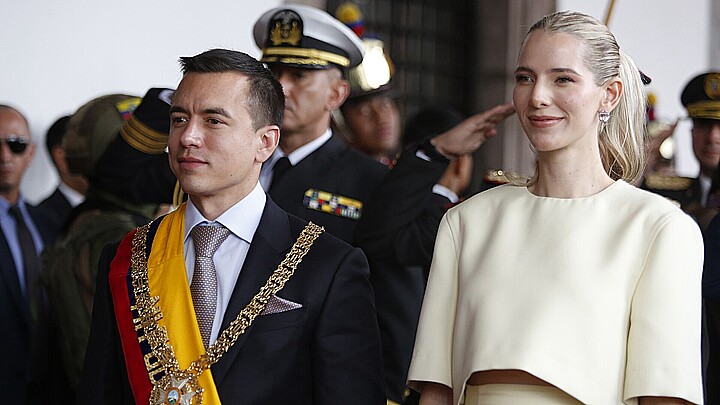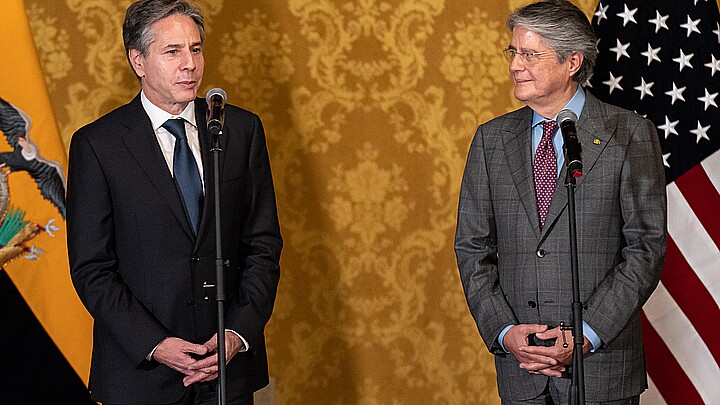Opinion & Reviews
OPINION: Latin American democracy in danger after Biden's first year
As the totalitarian dictatorships in Cuba, Venezuela and Nicaragua have shown us, inaction has devastating consequences
January 20, 2022 4:33pm
Updated: May 20, 2022 11:58am
This Thursday marks the end of President Joe Biden’s first year in office and – as a recent polls show – a clear majority of Americans disapprove of how his administration has handled the unrelenting coronavirus pandemic, the historically high inflation and his approach to foreign policy.
The new Gallup poll, which pegs the president’s approval at just 40% – with 56% disapproving – seems to mirror a Dec. 2021 PBS NewsHour/NPR/Marist poll which showed that while 56% of White individuals polled disapprove of Biden’s performance, 65% of Latinos said they disapproved of the job the president has done.
There is reason to believe that Latinos are growing tired of the Democratic Party’s progressive platform, which is often reminiscent of the socialist policies that many Latinos attempted to leave behind when they immigrated to the United States.
A 2020 post-mortem published by Equis Labs showed that 4 in 10 Latinos who voted in 2020 are concerned that Democrats are embracing socialism.
But has President Biden – who on the campaign trail promised to re-engage with Latin America, working to uphold democracy and the rule of law – done anything to stop the wave of socialism that has ravaged the region over the past year?
As we look back on his first year in office, it would appear that the answer is a resounding no.
Instead of expressing measured concern over the reemerging pink tide across Latin America, the Biden administration has instead congratulated incoming far-left leaders while attributing their victories to “free and fair elections.”
This has opened up new opportunities for socialist leaders and their anti-American, extra-regional allies such as China, Iran and Russia to collaborate in the region – creating security concerns for Washington.
Russia’s recent warning of a potential military deployment to Cuba and Venezuela if Ukraine negotiations fail is a fine example of that.
Ultimately, the president should remember his predecessor’s remarks from when he accepted the Nobel Peace Prize in December of 2009.
There, former President Obama sagely noted that, “Evil does exist in the world. A non-violent movement could not have halted Hitler's armies. Negotiations cannot convince al Qaeda's leaders to lay down their arms. To say that force may sometimes be necessary is not a call to cynicism – it is a recognition of history; the imperfections of man and the limits of reason.”
For as the totalitarian dictatorships in Cuba, Venezuela and Nicaragua show us, inaction has devastating consequences.
Mexico
One hundred days into Biden’s presidency, Luis Miguel Gonzalez, director of Mexico’s Economista said that Mexico’s experience with the new administration “has been similar to that of a spectator who has changed channels and can’t quite figure out what the movie is about.”
The administration’s migration policy is a clear example of this as Biden’s “iron first approach” has been “similar to that used by the Trump administration, just couched in humanist rhetoric.”
This can be seen through Biden’s reinstatement and expansion of Remain in Mexico, which is now applicable to citizens of any country in the Western Hemisphere.
But as human rights continue to deteriorate across the region, Biden’s administration is on pace to admit the fewest refugees in the history of the U.S. refugee program.
Nevertheless, arrests at the southern border are at a 21-year high as undocumented migrants continue to cross into the United States from Mexico.
In its first year, the Biden administration has overseen historic levels of illegal crossings. A related increase of drugs – including fentanyl – have entered the country as overdose deaths are at an all-time high across the U.S.
In a recent interview with The Epoch Times, former acting commissioner of Customs and Border Protection (CBP) Mark Morgan noted, “What we’re experiencing now on the southwest border is a complete, utter catastrophe.”
“We have lost control of the southwest border,” he added.
According to CBP data, agents apprehended nearly two million undocumented migrants in 2021 from more than 150 different countries along the U.S.-Mexico border – more than double the total number documented in 2019.
Yet before Biden’s change in direction, countless undocumented migrants were released from Border Patrol custody and were given Notices to Report, which require them to self-report to Immigration and Customs Enforcement within 60 days of their release.
Problematically, however, nearly 50,000 of those released into the U.S. have since disappeared and cannot be traced, according to a report from the Department of Homeland Security (DHS).
Even so, Homeland Security Secretary Alejandro Mayorkas issued a memo stating that being in the U.S. without documentation is no longer sufficient cause for arrest or deportation.
But Biden’s failures in terms of his relationship with Mexico goes much farther than immigration. He has also cast doubt on the United States’ commitment to free trade and open markets.
Just last week, Canada joined Mexico’s official complaint, requesting a dispute settlement panel to resolve a claim that the U.S. is violating The United States-Mexico-Canada Agreement (USMCA) – previously known as NAFTA – by insisting on a stricter interpretation of key provisions on auto parts.
According to Flavio Volpe, president of the Canadian Automotive Parts Manufacturers' Association, “the Trump administration ultimately came to a tri-partisan place with rules we all agree to.”
But although Volpe said he was relieved when President Joe Biden took office, he now believes there are “a lot of very protectionist leaders in that administration as well.”
“Some of us are really surprised to see the Americans go back on the commitments made during this negotiation,” he added.
Central America
Moving south to Central America, the Biden administration has been unable to address both the immigration crisis and the rising wave of authoritarianism in the so-called “Northern Triangle.”
According to a recent WOLA report, “Central America continues to face serious issues of insecurity, violence, poverty, growing authoritarian tendencies, and weak institutions.”
But while the Biden administration has indeed sent messages to the region’s corrupt regimes through sanctions and the diverting of aid – even launching an Anticorruption Task Force – it has been unable to engage authoritarian leaders like El Salvador’s Nayib Bukele or Nicaragua’s Daniel Ortega who view the administration as increasingly weak.
Although the administration has attempted to punish authoritarian and corrupt regimes in the region, it has sent mixed messages to incoming left-wing regimes with questionable trajectories.
One example of this can be seen when comparing Biden’s treatment of El Salvador and Honduras.
Under Biden’s watch, lawmakers in El Salvador systematically replaced Supreme Court justices and passed laws to dismiss hundreds of lower-level judges and prosecutors.
This move resulted in the new Supreme Court’s ruling that he could run for consecutive re-election, despite a constitutional prohibition – a clear nod to Bukele’s intention of staying in power indefinitely.
In this instance, the Biden administration chose not to invite El Salvador to the U.S. Summit of Democracies and instead focused on sanctions aimed at key Salvadoran officials.
Meanwhile, Vice President Kamala Harris will lead a delegation to Honduras on Jan. 27 to attend the inauguration of democratic socialist President-elect Xiomara Castro, the wife of former president and Hugo Chavez ally Manuel Zelaya.
According to a Reuters report published in Nov. 2021, critics aren’t sure what to make of a woman they consider a “dangerous radical,” remembering her husband’s closeness to the late Venezuelan strongman.
Shortly after her election, Castro thanked Venezuela’s Nicolás Maduro on Twitter after he congratulated her for returning “democracy and peace” to Honduras.
While the Central American female leader could certainly reverse policies that have weakened her country’s judicial system and emboldened criminal groups, analysts are weary of her desire to hold referendums on key policy issues.
In Latin America, such tactics have long been used by the left to solidify power since governments have used pressure tactics to swing votes in their favor.
According to Brendan O’Boyle at Americas Quarterly, many Hondurans didn’t trust Castro as a candidate and fear she might once again take the country in yet another wrong direction.
“For many, the self-described 'revolutionary' Castro would be far from a fresh start,” O’Boyle noted. “Before he was removed in a 2009 coup d’état, her husband had brought Honduras closer to Venezuela’s Hugo Chávez, and much of the business establishment still fears that the Zelayas want to pick up where they left off.”
Cuba, Venezuela and Nicaragua
Although Biden has admittedly maintained the status quo when dealing with Latin America’s three full dictatorships, this approach is unacceptable for a president who – on the campaign trail – said “democracy doesn’t happen by accident. We have to defend it, fight for it, strengthen it, renew it.”
In the past year, the Cuban government systematically engaged in abuses against critics of the regime, citizen journalists, artists and countless other individuals who dared to clamor for freedom during the Nov. 15 protests.
Abuses on the island have included arbitrary detention, torture, forced deportation and abuse-ridden criminal prosecutions in response to peaceful anti-government protests.
According to a recent ADN America report, the Cuban regime carried out around 9,700 repressive actions against the civilian population, making 2021 the worst year in the last two decades for human rights on the island.
In Venezuela – where inflation hovers at around 2,000% — the hunger brought about by a failed economy has only added to the regime’s many human rights abuses.
Although more than six million Venezuelans have fled the country since 2014, those who remain are unable to speak out against their failed leadership as Nicolas Maduro’s regime has continued to jail opposition voices and prevent free elections from moving forward.
In Nov. 2021, Venezuela became the first country in the Americas to be subject to a formal ICC investigation into crimes against humanity.
The November elections in Nicaragua were also widely condemned as fraudulent as Daniel Ortega began his fourth term.
Since taking office in 2007, his regime has dismantled institutional checks on presidential power and abolished term limits — setting the despot up for a lifetime in power.
But the dictator has not only barred opposing voices from challenging him electorally – he also engaged in torture and unlawful detentions.
According to the report, “Most critics have been held incommunicado and subjected to abuses in detention, including daily interrogations, prolonged solitary confinement, and insufficient food. Authorities have barred critics’ lawyers from participating in public hearings, assigning public defenders instead. Despite repeated requests, most lawyers had no access to court documents for months.”
Yet instead of taking firm actions against these repressive regimes, the Biden administration has been content with simply falling back on strong words and ineffective financial sanctions – once again signaling that it has no intention of bringing about real democratic change in the region.
Ultimately, Biden has shown his true colors this year and has demonstrated that he does not, in fact, feel committed to promoting democracy in the region.
This became evident on Dec. 30 when he joined a chorus of dictators – namely communist dictators Miguel Diaz-Canel of Cuba, Daniel Ortega of Nicaragua and Nicolas Maduro of Venezuela – in congratulating Chile’s new far-left president, Gabriel Boric, for his recent victory over free-market candidate Jose Antonio Kast.
Boric – a 35-year-old former student protest leader whose coalition includes the Communist Party – has promised to move forward with the country’s thirst for reform and supports the move to reform Chile’s prolific private pension fund administrators (AFPs) and the constitution, which is currently being re-written by a constitutional convention.
Similarly, his administration was quick to send congratulations to Peru’s socialist President Pedro Castillo – who has promised to overturn the many free-market reforms that allowed the Peruvian economy to grow exponentially in the 1990s and 2000s.
As the last few bastions of liberty are on the verge of falling to Latin America’s pink wave – namely Colombia and Brazil – the president should remember that it is indeed the United States’ historic and moral role to promote democracy and freedom throughout the world – but especially in our hemisphere.
To continue to disregard our southernmost neighbors only invites despots like Lula da Silva and his cronies to openly speak of creating “bases for our socialist project.”









